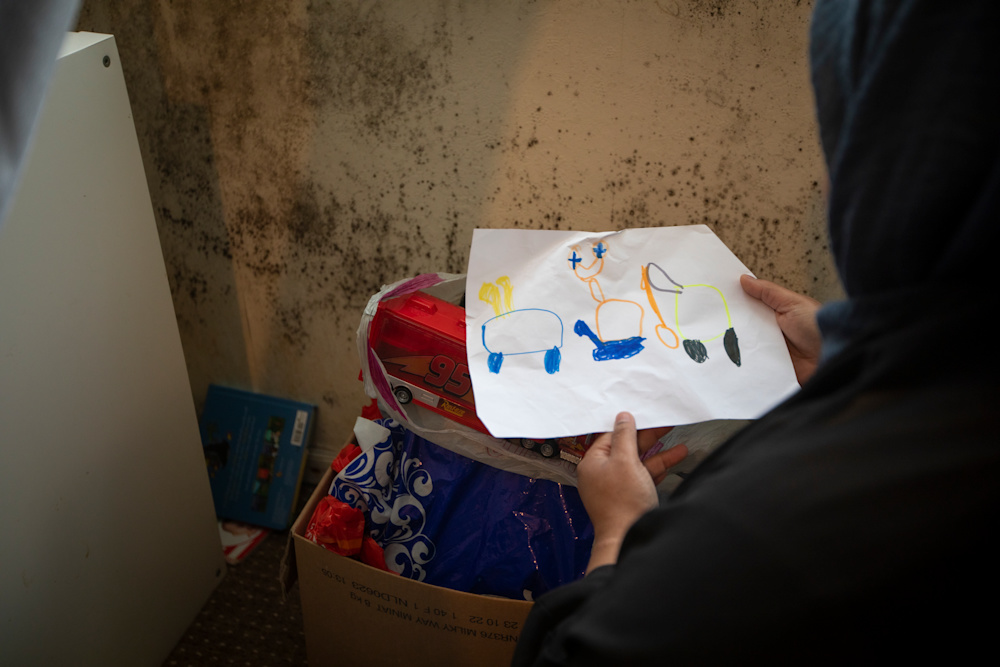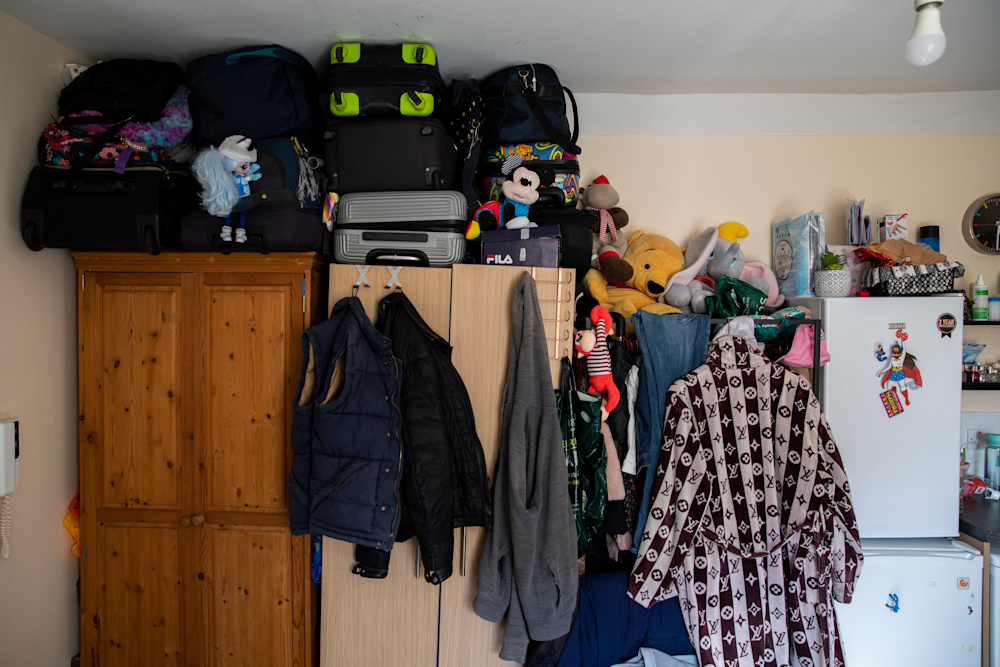Updates and impact
Another shameful record of child homelessness: we must invest in social homes
Published date: 8 August 2024

Deborah Garvie
Policy Manager
I’m stuck in this cage where I can’t afford anything. I’m forced to live in poverty when I’m a capable person. I’m having to turn down work.’ - A quote from a steering group member from the Still Living in Limbo report.
151,630 babies children and teenagers are homeless in England, with their families in a state of uncertainty in damaging temporary accommodation.
This must be shouted from the rooftops. It’s a shameful record.
Beyond the shocking numbers, it’s important we all know what it actually means to be homeless as a child in temporary accommodation.
What are they going through now, while their classmates enjoy being at home during the summer holidays?
Months and years of uncertainty
Families don’t know how long they’ll be there or when they may be moved at short notice. They’re moved from place to place and area to area, often with less than 48 hours' notice.
This is very unsettling and frightening for children and teenagers, who thrive on stability and feeling safe in a familiar neighbourhood close to friends.
And this state of uncertainty is far from temporary. More than two-thirds (68%) of families have spent a year or more homeless. In some cases, it’s over 10 years.
Precious childhood years are slipping away, marred by the trauma of homelessness in damaging temporary accommodation, dreaming of a home other families take for granted.
Victorian, slum-like conditions

At first, families are usually accommodated in one hotel room, having to share beds. It’s rare to have access to cooking or laundry facilities.
Other families are offered hostels and homeless B&Bs, where they have to share a kitchen, toilet and bathroom with an ever-changing stream of other families and, sometimes, people without children. The number of families with children in accommodation such as bed and breakfasts and hostels has reached 8,860 – a rise of 29% in a year.
They may be moved onto so-called ‘self-contained rooms’ or ‘studios’: often a cramped room with one or two beds and an ill-equipped kitchenette, but no room for a table to eat at. Parents describe conditions as ‘cell-like.’
It’s common for such places to lack facilities essential to a functioning family life, such as WiFi and washing machines. They may eventually be moved into a larger temporary place. But conditions remain dire. Around ¾ of people report poor conditions, including serious health and safety hazards, like faulty wiring or damp and mould. Over ⅓ report infestations of cockroaches, mice and rats.
Over 36,000 (31%) households are now accommodated out-of-area, sometimes miles from their previous home. This leaves families feeling isolated from family and friends and facing long, costly commutes to work and school.
The impact on children’s wellbeing and education
As we know from the tragic death of Rochdale toddler, Awaab Ishak, hazardous living conditions can kill young children. Since 2019, 55 babies and children have died suddenly and unexpectedly as a result of living in temporary accommodation.
Given the frequent moves, length of stays and shocking conditions, there’s an inevitable toll on children’s health, particularly mental health. In the Still Living in Limbo report, 57% of parents reported a negative impact on their children’s physical or mental health, with 26% reporting their child is often unhappy or depressed. We regularly work with children with disabilities and health problems (such as neurodiversity), which are exacerbated by homelessness.
With the new school year starting in less than a month, such living conditions are hardly conducive to education:
sharing beds in cramped family rooms, hearing voices of strangers outside the door or mice scurrying around, and long commutes to school leave children shattered
a lack of privacy and WiFi make it extremely difficult for teenagers to study. 26% of parents say their children are unable to keep up or have performed poorly because of living in temporary accommodation
long or impracticable commutes mean children can’t remain at a school where they’re thriving and can wait months for a new place. Shockingly, almost half (47%) of children have had to move schools. More than half (52%) of parents report their children have missed days off school and, of these, 37% have missed more than a month
The government must act to tackle child homelessness
It’s fantastic the new government is prioritising ‘making changes to ensure children are safe, healthy, happy and treated fairly’ via a Children’s Wellbeing Bill.
It’s also great they’ve ‘hit the ground running’ on developing a strategy to tackle child poverty, via a new ministerial taskforce and child poverty unit.
At the forefront of both, there must be a commitment to end child homelessness.
Temporary accommodation entrenches child poverty because:
despite the appalling conditions, it’s shockingly expensive. 87% of households struggle to keep up with the costs, 26% report falling behind and almost half (47%) have borrowed to keep up. A lack of cooking and laundry facilities increases household costs
impracticable, unaffordable commutes result in around 27% of parents having to reduce their working hours and around 11% having to give up work entirely (11%). Record homelessness is negatively impacting England’s economy
I had lost my job because we had been moved so far away and my daughter missed about two months of school.’ - A quote from a survey respondent from the Still Living in Limbo report.
The next steps are crucial
If the government is to achieve its ambition that ’every child should have a loving, secure home’, and succeed where previous governments have failed, it must act fast to tackle this shameful record of child homelessness. Every month that goes by is putting children at risk.
we need urgent action on homelessness. The government promised voters they’d deal with the ‘sharp rise in hidden homelessness’ by developing a new cross-government strategy, working with mayors and councils across the country, to put Britain back on track to ending homelessness.' We need this urgently. It must address the adequacy of housing benefits.
we need renters’ rights to prevent homelessness. The government promised to ‘overhaul regulation of the private rented sector’ to ‘immediately abolish Section 21 no-fault evictions, prevent private renters being exploited and discriminated against, empower them to challenge unreasonable rent increases and take steps to decisively raise standards. The Renters’ Rights Bill must deliver this, including addressing the eye-watering in-tenancy rent increases which force families out
most importantly, we need investment in social rent homes. Last week, Deputy Prime Minister, Angela Rayner, highlighted ‘total homelessness at record levels’ to announce ‘immediate steps for the biggest boost to social and affordable housing in a generation’ with a ‘focus on social rent.’
Investment in genuinely affordable social rent homes is the key
Homelessness cannot be ended without this investment, alongside real reform to land planning and a boost to council building.
Without this urgent capital investment, via a new, reformed Affordable Housing Programme, another generation of children will be forced to grow up homeless in damaging temporary accommodation, missing out on the stability and space they need to thrive.
Our new Brick by Brick report shows how by investing in ramping up to 90,000 social rent homes a year this parliament, with rents pegged to local incomes, the government can end homelessness for good. This would save billions of pounds that councils are spending on temporary accommodation. Money saved to the NHS, housing benefit and other crisis-driven spending, would mean it pays for itself within three years, drawing a line under the housing emergency once and for all.
Here’s how you can help
In the meantime, we need your help to support and fight alongside the thousands of families stuck homeless in damaging temporary accommodation.
join our campaign for the government to invest in social rent homes
please donate any amount you can so that services like our free national helpline and local hubs can help more families enforce their rights to a suitable, settled home

